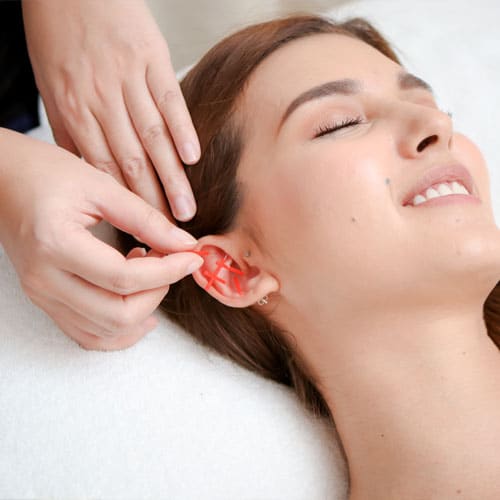By Lori Fiester, Clinical Director of the Center for Recovering Families
I have been in the social work field for approximately 32 years and have seen trends come and go in substance abuse treatment settings. Treatment for substance abuse was primarily geared to the 12 Steps when I first entered the field, along with licensed chemical dependency counselors. Today we have a plethora of providers that give a vast array of therapeutic interventions that can assist those seeking help. Recently, I stumbled upon an opportunity to learn another intervention that can assist people who want to get sober, are sober, or are in sustained recovery, called Acudetox.
Acudetox is a five-point acupuncture protocol specifically designed for those struggling with substance use issues. The acupuncture needles are gently placed in the ear at specific points. This helps balance the body’s energy and assists the healing process. It is referred to in Eastern medicine as a yin tonification, restoring calm inner qualities like serenity. This process is best done in a group setting lasting from 30-45 minutes and is non-verbal with minimal interaction from the facilitator.

Acudetox has shown to decrease cravings for alcohol and drugs, withdrawal symptoms, relapse episodes, anxiety, insomnia and agitation. Even more exciting, the effects can be immediate. There are usually no side-effects and the intervention is inexpensive. Clients report relaxation, stress and craving reduction, mental clarity, an increased sense of wellbeing and more energy. Programs have reported more successful completions and less client discharge against medical advice, along with higher client satisfaction improvement.
This seemed too good to be true, so off I went to get trained in Acudetox. As a result, I’m a firm believer that this intervention can assist anyone in the process of recovery. While practicing the protocol, I experienced immediate relaxation myself and noticed later that my mindless eating wasn’t as mindless. As I practiced on friends and colleagues, they reported decreased blood pressure, better sleep and more concentration. Even those who chose not to have the intervention in the group setting experienced a meditative state. As a therapist, it’s an interesting shift from talk therapy to inserting needles, but I see the value as clients become more aware of their body and their thoughts, and are able to settle more quickly to begin their work.
The Council is offering Acudetox to clients in The Center for Recovering Families’ Intensive Outpatient Program, and is also now offering appointments open to the general public. Click here for more information on Acudetox or to register for a session.
